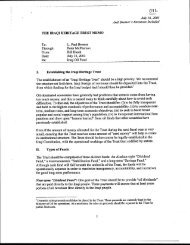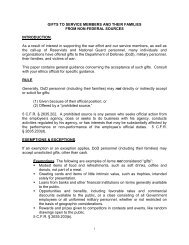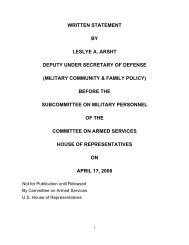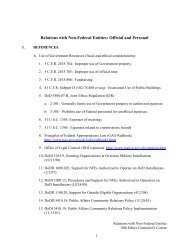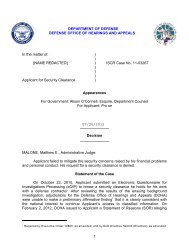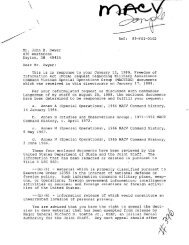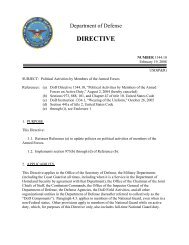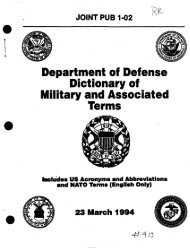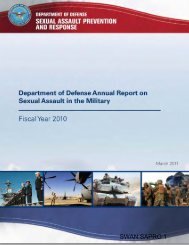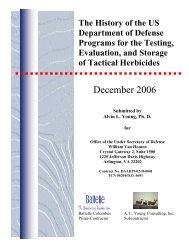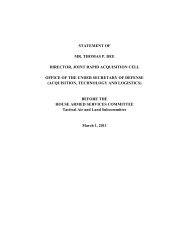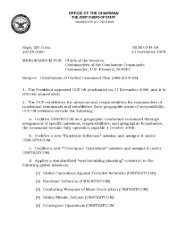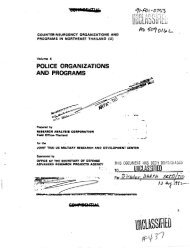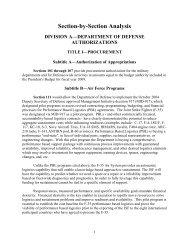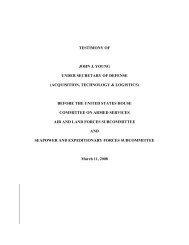DoD FOIA EO 13526 Guidance - United States Department of Defense
DoD FOIA EO 13526 Guidance - United States Department of Defense
DoD FOIA EO 13526 Guidance - United States Department of Defense
Create successful ePaper yourself
Turn your PDF publications into a flip-book with our unique Google optimized e-Paper software.
srobinson on DSKHWCL6B1PROD with MISCELLAN<strong>EO</strong>US<br />
722 Federal Register / Vol. 75, No. 2 / Tuesday, January 5, 2010 / Presidential Documents<br />
may authorize the disclosure <strong>of</strong> classified information (including information<br />
marked pursuant to section 4.1(i)(1) <strong>of</strong> this order) to an individual or individuals<br />
who are otherwise not eligible for access. Such actions shall be taken<br />
only in accordance with directives implementing this order and any procedure<br />
issued by agencies governing the classified information, which shall<br />
be designed to minimize the classified information that is disclosed under<br />
these circumstances and the number <strong>of</strong> individuals who receive it. Information<br />
disclosed under this provision or implementing directives and procedures<br />
shall not be deemed declassified as a result <strong>of</strong> such disclosure or<br />
subsequent use by a recipient. Such disclosures shall be reported promptly<br />
to the originator <strong>of</strong> the classified information. For purposes <strong>of</strong> this section,<br />
the Director <strong>of</strong> National Intelligence may issue an implementing directive<br />
governing the emergency disclosure <strong>of</strong> classified intelligence information.<br />
(c) Each agency shall update, at least annually, the automatic, routine,<br />
or recurring distribution mechanism for classified information that it distributes.<br />
Recipients shall cooperate fully with distributors who are updating<br />
distribution lists and shall notify distributors whenever a relevant change<br />
in status occurs.<br />
Sec. 4.3. Special Access Programs. (a) Establishment <strong>of</strong> special access programs.<br />
Unless otherwise authorized by the President, only the Secretaries<br />
<strong>of</strong> State, <strong>Defense</strong>, Energy, and Homeland Security, the Attorney General,<br />
and the Director <strong>of</strong> National Intelligence, or the principal deputy <strong>of</strong> each,<br />
may create a special access program. For special access programs pertaining<br />
to intelligence sources, methods, and activities (but not including military<br />
operational, strategic, and tactical programs), this function shall be exercised<br />
by the Director <strong>of</strong> National Intelligence. These <strong>of</strong>ficials shall keep the number<br />
<strong>of</strong> these programs at an absolute minimum, and shall establish them only<br />
when the program is required by statute or upon a specific finding that:<br />
(1) the vulnerability <strong>of</strong>, or threat to, specific information is exceptional;<br />
and<br />
(2) the normal criteria for determining eligibility for access applicable<br />
to information classified at the same level are not deemed sufficient to<br />
protect the information from unauthorized disclosure.<br />
(b) Requirements and limitations.<br />
(1) Special access programs shall be limited to programs in which the<br />
number <strong>of</strong> persons who ordinarily will have access will be reasonably<br />
small and commensurate with the objective <strong>of</strong> providing enhanced protection<br />
for the information involved.<br />
(2) Each agency head shall establish and maintain a system <strong>of</strong> accounting<br />
for special access programs consistent with directives issued pursuant<br />
to this order.<br />
(3) Special access programs shall be subject to the oversight program<br />
established under section 5.4(d) <strong>of</strong> this order. In addition, the Director<br />
<strong>of</strong> the Information Security Oversight Office shall be afforded access to<br />
these programs, in accordance with the security requirements <strong>of</strong> each<br />
program, in order to perform the functions assigned to the Information<br />
Security Oversight Office under this order. An agency head may limit<br />
access to a special access program to the Director <strong>of</strong> the Information<br />
Security Oversight Office and no more than one other employee <strong>of</strong> the<br />
Information Security Oversight Office or, for special access programs that<br />
are extraordinarily sensitive and vulnerable, to the Director only.<br />
(4) The agency head or principal deputy shall review annually each special<br />
access program to determine whether it continues to meet the requirements<br />
<strong>of</strong> this order.<br />
(5) Upon request, an agency head shall brief the National Security Advisor,<br />
or a designee, on any or all <strong>of</strong> the agency’s special access programs.<br />
(6) For the purposes <strong>of</strong> this section, the term ‘‘agency head’’ refers only<br />
to the Secretaries <strong>of</strong> State, <strong>Defense</strong>, Energy, and Homeland Security, the<br />
VerDate Nov2008 17:28 Jan 04, 2010 Jkt 220001 PO 00000 Frm 00018 Fmt 4705 Sfmt 4790 E:\FR\FM\05JAE0.SGM 05JAE0



